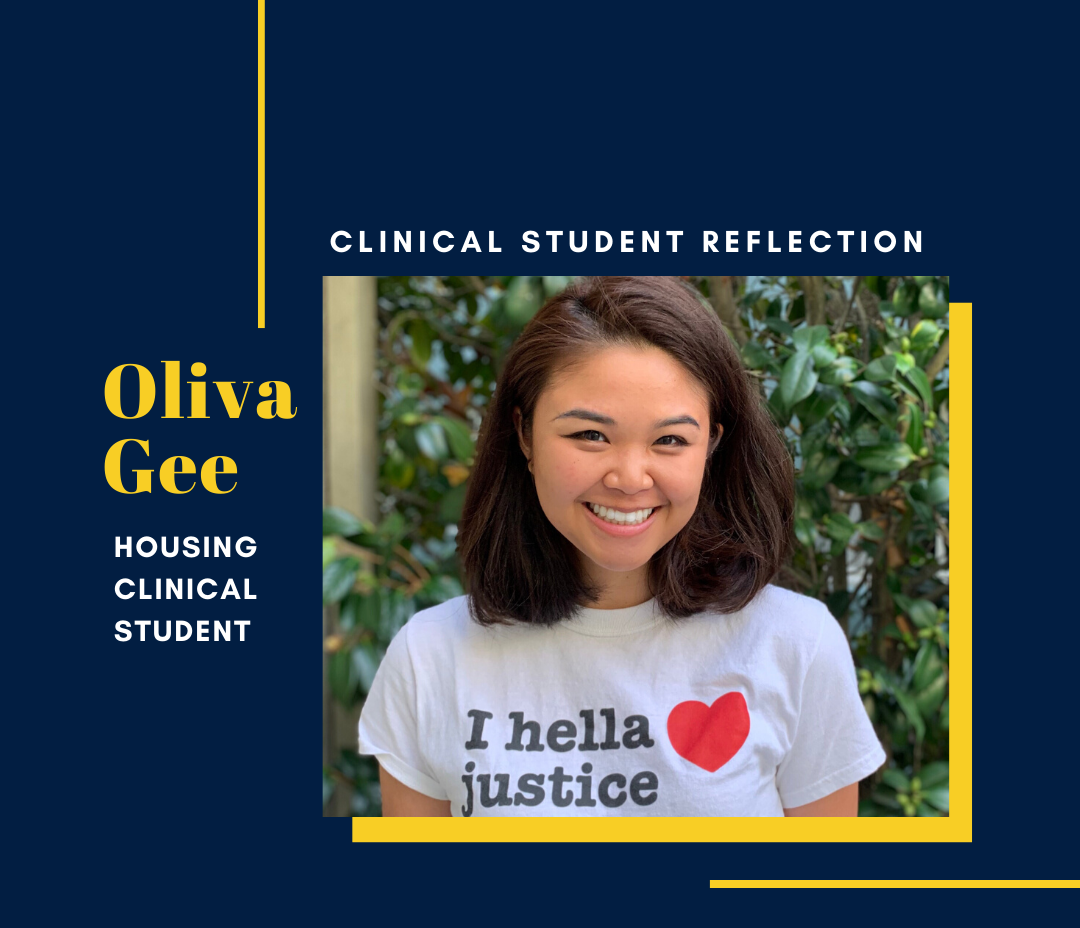
My mantra, like that of many Oakland natives, has always been, “Fight the power.” I came to law school with the intention of striving for justice on multiple institutional fronts, hoping I could leverage the law to reorganize society’s power imbalances. But throughout most of law school, I grew increasingly disenchanted by lawyers’ limits — both in their conception of justice and in their abilities to achieve meaningful results for impacted people. I resented being in an institution so invested in preserving certain structures (and, by extension, barriers), emphasizing the law’s heightened importance, and praising incremental change above all else. Luckily, the opportunity to intern in EBCLC’s Housing Clinic reminded me of our capacities as legal advocates and taught me the type of lawyer that I want to be.
Before being part of the Housing Clinic, the majority of my (limited) experience had been in criminal law and criminal ‘justice,’ and most of that experience had centered specifically on post-conviction remedies and extreme punishment. After my 1L year, I spent the summer interning in EBCLC’s Clean Slate Clinic, supporting impact lawsuits and records remedies, and I fell in love with the organization’s models of teaching and client-centered lawyering. The opportunity to experience the duality of direct services and litigation taught me as much about responding to the needs created by the carceral system as it did about case management and the difficulty of achieving the praxis of social justice lawyering, and I was grateful to finally be amongst others who questioned the role lawyers should play in seeking justice. Because I’d had such a fulfilling summer, I knew right away that I wanted to apply for a clinic semester in the future.
Law school dragged on but also flew by, and suddenly I only had one last chance to apply for a clinic. By then, Housing was the obvious choice for me — working closely with clients was non-negotiable, and I felt a particular inclination towards the fast-paced, litigious nature of eviction defense. And, as someone who’d grown up in Oakland, it felt critical to engage in work that directly fights back against the gentrification of the Bay Area.
Spending my final law school semester in the organization where I first fell in love with public interest law not only reminded me of my commitment to client-centered representation and advocacy but also helped me find new ways to love this work. In particular, I was surprised to find how much I enjoyed brief services appointments helping tenants facing eviction — who may or may not become EBCLC clients — prepare responsive filings. I’ve always loved working with clients and building strong, long-term relationships with them, and clinic reinforced that love every day. But previously, brief services interactions had intimidated me. How could I prevent myself from getting attached to the client? How could I draw firm boundaries around our relationship and the meeting’s scope? Although I continued to grapple with these concerns throughout the semester, my worries were met with support, affirmation, and solutions. Being able to witness, learn, and practice new strategies for thoughtful, trauma-informed client counseling helped me harness the compassion I felt towards clients to create a safe, empowering space in our brief services encounters.
All semester, I was amazed and inspired by the radical compassion, tenacity, genius, and grit of my law student colleagues and our supervising attorneys, while staying grounded in the reality that these solutions are imperfect and temporary. My clinic supervisor reminded me to remain critical of lawyers’ capacities and roles. Particularly in such a quick-paced, chaotic, high-stakes practice of legal aid, I was and am grateful to have been given the space and encouragement to situate our work within broader social movements for progress. But instead of becoming yet more disenchanted, I was constantly reminded of the tangible, meaningful ways we’re able to help people through legal aid. I’m grateful for this reminder, because it is also a reminder that fighting the power doesn’t mean placing lawyers in yet more positions of power.
While our structures and systems are still in dire need of reconstruction, being able to empower and support clients while collaborating on solutions to their immediate needs is precisely what I hope to continue doing throughout my life. My semester in the Housing Clinic helped me expand, strengthen, and nuance my approach to advocacy. As I prepare to begin my career, I know that all of my most important lessons from law school are from my time at EBCLC.